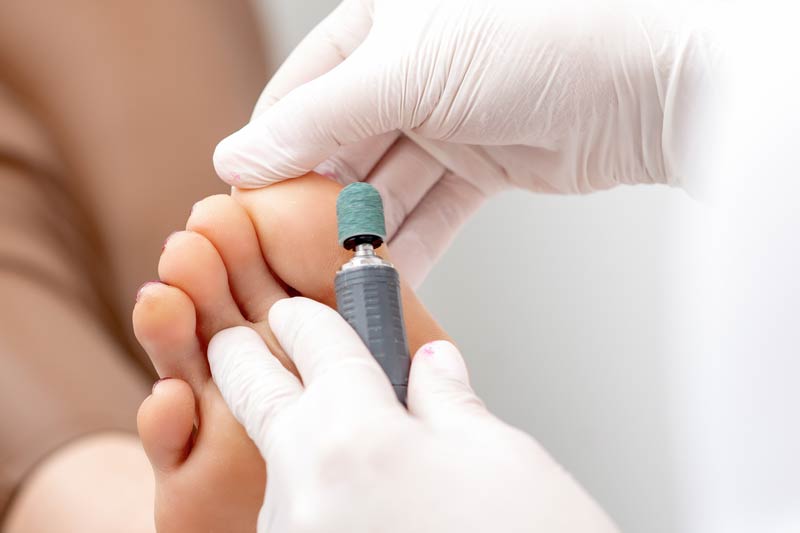Podiatry Treatments
Corns and Callus
Corns and callus are very common complaints that cause discomfort in shoes and when walking. Fortunately, we can offer lots of treatment options and advice in how to best deal with these and to keep them at bay for as long as possible.

What are corns and callus?
We all have skin that is thicker on the heel and ball of our feet. This thick skin is there to withstand the pressure of walking and standing. However, when the pressure becomes excessive, some areas of skin thicken further and form callus and corns. It is a protective response from the body to the friction of skin rubbing against bone, the ground or your shoes.
Callus (or callosity) is an extended area of thickened, hard skin on the soles of the feet. It can be caused by inappropriate footwear, a particular walking style or an underlying issue such as a bone deformity. Elderly people are more likely to form callus on the ball of their feet. This is because they have less fatty tissue in their skin and the callus forms to provide additional protection.
Corns are caused by very centralised pressure or friction over bony areas of the feet. Pain comes from the corn having a central core that can press on a nerve. It is often described as like having a pebble in your shoe. There are different types of corn including hard corn, soft corn, tiny seed corn, vascular corn and fibrous corn. Each type can present different issues for the foot and varying levels of pain.
Podiatrist treatments for corns and callus
Please do not cut corns yourself, especially if you are elderly or have diabetes. At the Dartford Foot Clinic, we can treat corns painlessly using various methods. The main being debridement and enucleation where we gently and painlessly reduce the overlying hard skin and then remove the central core. The relief is instant. People come hobbling in and floating out, often commenting why on earth did they put up with it for so long! We will also apply appropriate padding.
If needed we can make insoles to relieve pressure and fit corrective solutions to give long term relief.
We can help with callus in several ways. We can remove hard skin as well as relieve pain by redistributing the pressure on the foot. This can be achieved with soft padding, strapping or corrective appliances that fit within your existing shoes. These treatments are designed to help the skin to return to its normal state.
We can also suggest skin preparations (e.g. emollient creams) to help improve the skin’s natural elasticity – this can help to delay callus build-up.
Share:



